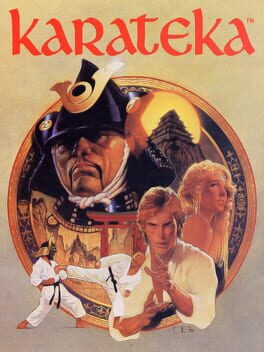

Karateka is a 1984 beat'em up video game by Jordan Mechner, and was his first game created while attending Yale University. It was originally programmed for the Apple II, and was later ported to several other home computers and early gaming consoles. The game was published in North America by Brøderbund, and in Europe by Ariolasoft. The player controls an unnamed protagonist who is attempting to rescue his love interest, the Princess Mariko, from Akuma's castle fortress. The game exhibits a combination of a side-scrolling platform and fighting game elements. The player uses punches and kicks to defeat Akuma and his guards and make his way deeper into the fortress. The game, as with most at the time of development, lacked checkpoints or the ability to save the game, making it a challenge to complete in a single sitting. Karateka has been well-received, particularly for its realistic animations used for the game's characters. The game was considered a breakthrough success for Mechner, and would eventually result in his development of the Prince of Persia franchise. A high-definition remake, spearheaded by Mechner, was released as a downloadable title for the Xbox 360, Microsoft Windows, PlayStation 3, with planned ports for the iOS and Wii U systems.
Released on
Genres
Reviews View More
The original Apple II version of Karateka is quite a hard one to quantify and qualify; on one hand here lies one of the most groundbreaking games of all time, responsible for influencing games like Ninja Gaiden on early cutscenes and for being a notable very early example of rotoscoping for realism in movement, something taken to extremes in 1991's Mortal Kombat. The level of detail for the time and sheer effort is unmistakable and Karateka really did game so much to the game industry in its time.
However, upon actually playing it there's a lot to be desired, especially in a modern setting. Chief of this is the degree to which movement is delayed, something which is vital to success. You are able to move away from an adversary and even cancel out of a current string of attacks to evade, but once the Karateka takes a step back or forward he commits completely - a movement which can take an entire second.
In Level 3, where your health bar is substantially lower than all of your adversaries, this can actually become very frustrating and contribute to a feeling of lack of complete control, leaving you often vulnerable to the opponent's next attack because the AI is made to respond to your last input rather than account for human error. Other than this though, the level of pure strategy involved really does a good job of accurately mirroring the strategy of karate itself for its time.
Two little design choices make it a bit rough, the existence of a trap that instakills you and isn't very easy to figure out how to maneuver past, as well as a mini-boss in the form of a vulture that requires more precision to fight than anything else in the game, which is very tough considering the considerable lag between input and action. Both constitute a difficulty spike that will easily kill a player who otherwise, through careful and considered approach, could beat the game in a few attempts after getting into the feel of the combat well enough.
I found everything about the game very impressive, it's visually very beautiful, the music has a lot of effect for being so minimal, and the sense of momentum and flow in the movements seems like something that just shouldn't be possible on such a platform. Shows you what can be achieved within tight limits if you have the vision and know-how.
Played on The Making of Karateka (2023) documentary game on steam. Of the included versions, this original was my favorite, I just thought it felt the best in moment-to-moment action and visuals. However the sound is way cooler in the others, and the remake in that collection is pretty faithful to the core design concepts.
Principalmente depois de horas de documentário mostrando o quão incrível Karateka era pra época, é fácil entender a importância histórica dele. E devo dizer que as animações e os motifs musicais ainda impressionam muito.
Mas eu não consegui jogar mais que 15 minutos de nenhuma das versões originais, é realmente um produto de sua época. Se quiser realmente JOGAR, aconselho procurar Karateka Remastered na coletânea e focar nele.
